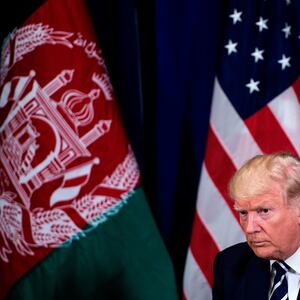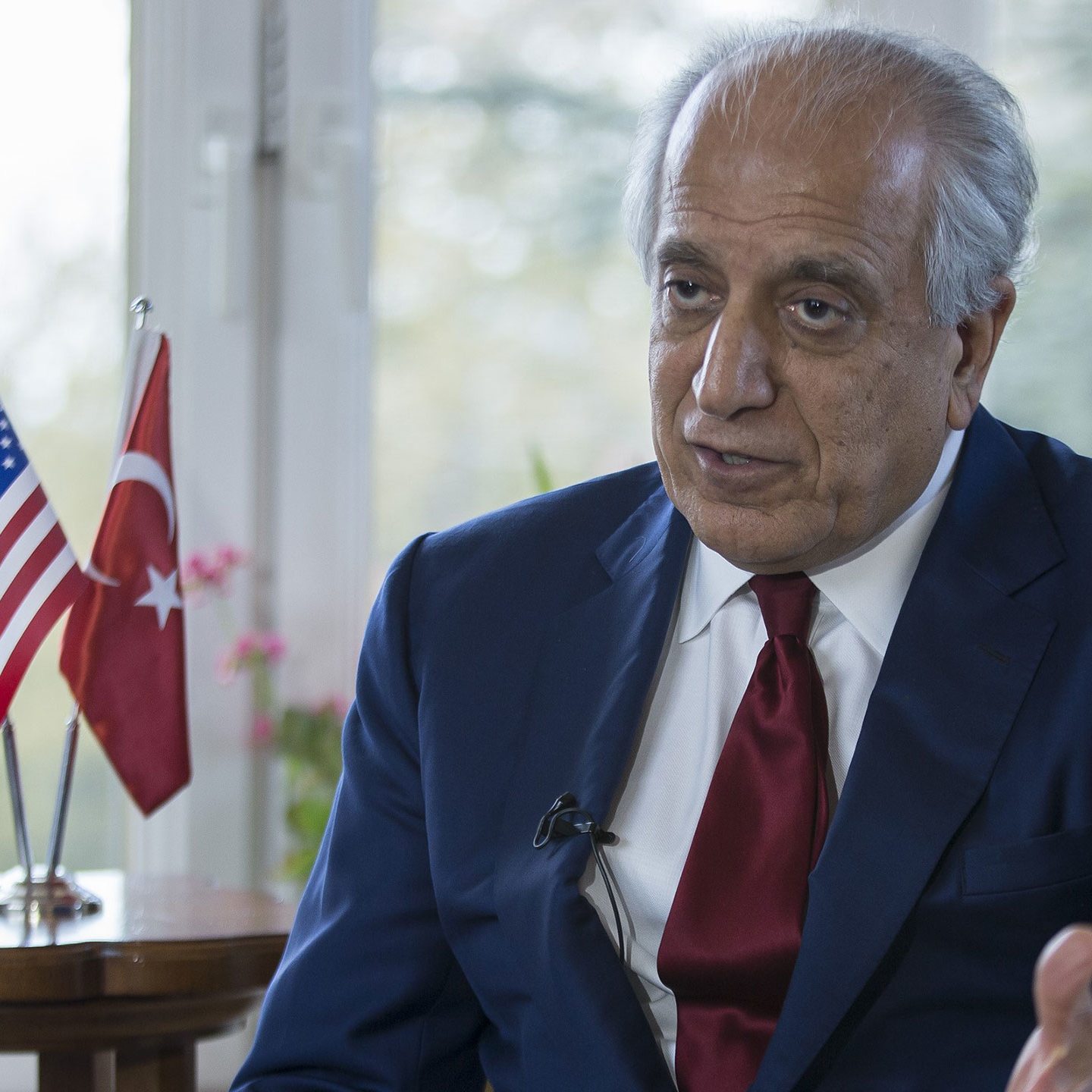President Donald Trump said on Thursday that the U.S. would “always” have a “presence” in Afghanistan. But his representative in the region, Ambassador Zalmay Khalilzad, is trying to quietly iron out with the Taliban and the Afghan government a deal that could include an almost complete withdrawal of American troops by the 2020 election, according to three sources who have direct contact with individuals involved in the ongoing negotiations.
Although conversations are still ongoing, sources say many of the points in the text of the agreement have been agreed upon, and there’s at least one point still up in the air—the exact plan for getting out of Afghanistan. As Khalilzad inches closer to a deal with both parties, those close to the negotiations have said that there are mixed messages emanating from various agencies within the Trump administration about troop limits, when forces would leave and what conditions the U.S. would put in place for the Taliban as a precursor to the withdrawal.
The demand for the withdrawal plan came from the Oval Office earlier this month when President Trump told his advisers and cabinet officials that he wanted completely out of the country by the time he took the stage at his last campaign event in 2020, four sources familiar with the request told The Daily Beast.
The White House did not respond to a request for comment.
The plan is ruffling feathers inside the Trump administration as senior officials in the Department of Defense and officials inside the Afghan government push for the U.S. to keep some forces in the country for the foreseeable future. Now, Khalilzad is under pressure to please all sides, including the many factions of the Taliban, which has long demanded that all foreign troops leave the country. The next few days of talks could determine the final decision.
The withdrawal plan, as it is being discussed this week, is conditions-based and would allow the U.S. to change course on troop levels if the parties reneged on any part of the agreement, which has yet to be finalized, sources said. Some of the conditions floated in the ongoing conversations include the Taliban committing to adhering to the country’s constitution, upholding women’s rights, and agreeing to continuously engage in good-faith talks with officials in the Ghani government.
The U.S. is still trying to formalize the details of the 14-month plan and officials are considering whether to leave a small contingent of residual forces in the country, potentially in an advisory capacity, sources said. Other senior officials, including the president, have continuously pushed for the total withdrawal of troops. Two sources familiar with the president’s thinking on the matter said he wants to be able to use the withdrawal as a way of proving his foreign policy bona fides in the leadup to the 2020 election.
“Pulling troops out of Afghanistan and ending our nearly two-decade-long engagement there isn’t just the right policy move, it’s a winning political move,” said Andrew Surabian, a political adviser to Donald Trump Jr. and a former White House official. “Americans are sick and tired of endless wars and getting us out of these boondoggles is one of the main reasons President Trump was elected in 2016 and one of the main reasons he will be re-elected in 2020.”
Two people who’ve heard the president discuss the war in the past year tell The Daily Beast that Trump has, sometimes while yelling and swearing, many times stated his desire to have U.S. troops removed from Afghanistan before Election Day 2020, seeing the withdrawal as a core promise to his base and voters. One senior administration official said that during a White House meeting earlier this year, when the topic of troop levels came up, Trump stressed that he “want[ed] them the hell out” of Afghanistan and that the administration just needs to “get it done!”
But some of the president’s closest allies, such as the notably hawkish Sen. Lindsey Graham (R-SC), have repeatedly urged Trump against ordering this. “As to debating Joe Biden, I think it would be easy for President Trump to remind people that: Aren’t you the guy, Biden, who said it was OK to leave Iraq, that led to the rise of ISIS?” the senator told Axios early this month.
The president has been at this crossroads before. In his first year in office, after initially arguing against his own military advisers on a troop surge, Trump ultimately escalated in Afghanistan anyway. And in the time since, the president’s frustrations on America’s longest war have built, or at least re-emerged.
The negotiations with the Taliban and the Ghani government are expected to come to a close over the next several weeks, two senior U.S. officials told The Daily Beast. Other elements of the agreement, to be unveiled in a public ceremony in Doha, Qatar include a ceasefire, demands that the Taliban not use Afghanistan as a safe harbor for terrorist organizations like al Qaeda and ISIS and a roadmap for future official talks.
“Any potential peace deal will not be based on blind trust, but will instead contain clear requirements and commitments that are subject to our monitoring and verification,” a spokesperson for the State Department said. “Any potential deal would bring together all sides for negotiation, enable the withdrawal of American forces, and ensure the security of the American homeland. “
But it’s unclear how much of these negotiations will be consummated. Off-and-on talks with the Taliban have been going on, in one form or another, over the course of a decade. And it’s not at all apparent that every faction of the Taliban will adhere to a deal, even if one is proclaimed.
One of the Taliban’s main asks in the Khalilzad negotiations is the total withdrawal of U.S. troops. Some senior officials in the upper echelons of the Trump administration national security apparatus say as long as the U.S. enacts strict protocols and monitoring, a plan for an almost complete drawdown can proceed.
“The U.S. has to give the Taliban enough for the group to feel comfortable promoting the fact that it achieved the withdrawal of troops,” one former U.S. official told The Daily Beast. “But at the same time we need to make sure that the Taliban doesn’t just wait it out and then go take over swaths of land and implement their own.”








